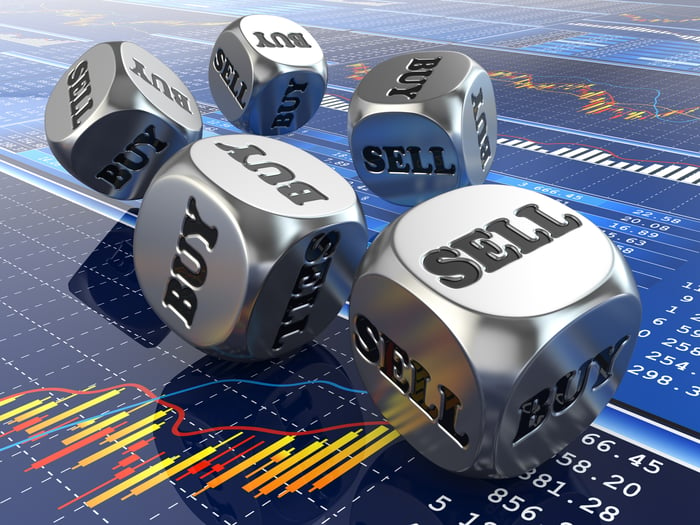|
|
|

|
|||||

|
|
Quarterly Form 13Fs offer an up-close look at which stocks Wall Street's smartest asset managers have been buying and selling.
Though profit-taking may explain why billionaire Terry Smith exited his fund's position in Apple, there may also be more nefarious factors at work.
A market leader in an industry where consumer expenditures consistently increase is the new apple of Terry Smith's eye.
The flow of information is constant and sometimes overwhelming on Wall Street. Trying to interpret an onslaught of earnings reports and monthly economic data releases each quarter can easily allow something of importance to go unnoticed.
For example, May 15 marked the deadline for institutional investors with at least $100 million in assets under management to file Form 13F with the Securities and Exchange Commission. This is a required filing no later than 45 calendar days following the end to a quarter that provides investors with an up-close look at which stocks, exchange-traded funds (ETFs), and select options Wall Street's smartest asset managers have been buying and selling.
Where to invest $1,000 right now? Our analyst team just revealed what they believe are the 10 best stocks to buy right now. Continue »
As you might have guessed, Berkshire Hathaway's billionaire CEO Warren Buffett tends to be the most-followed of all money managers -- but he's not the only billionaire fund manager known for their investing prowess.

Image source: Getty Images.
The aptly dubbed "Warren Buffett of Britain," billionaire Terry Smith of Fundsmith, is another asset manager investors closely follow. Smith is an ardent value investor who, like Buffett, has an exceptional track record of spotting phenomenal deals hiding in plain sight.
Over a four-quarter period (April 1, 2024 – March 31, 2025), Fundsmith's 13Fs show Terry Smith completely dumped Berkshire Hathaway's No. 1 holding, Apple (NASDAQ: AAPL), and more than 11X'd his fund's stake in a company whose addressable market is expected to grow by a compound annual rate of 10.5% through 2032.
For more than half a decade, Apple has been Berkshire Hathaway's top holding. Buffett has come to appreciate the exceptional loyalty Apple's customers show to the brand, CEO Tim Cook's leadership in building up its higher-margin subscription services segment, and Apple's world-leading capital-return program.
Since kicking off its share-repurchase program in 2013, Apple has bought back around $775 billion worth of its own stock and reduced its outstanding share count by more than 43%. This has had a positive impact on earnings per share (EPS) and has made Apple stock more fundamentally attractive to value-seeking investors.
Despite these positives, the Warren Buffett of the U.K. exited his fund's entire stake in Apple over the last year, with 1,597,544 shares being sold.
One possible reason behind this selling activity is simple profit-taking. Between the third quarter of 2022, which is when Fundsmith first opened a position in Apple, and sometime in the third quarter of 2024, which is when Terry Smith sent these shares to the chopping block, shares of the company rallied from roughly the $150s to the $220s. This is a really nice gain for a megacap company in just two years, and may have enticed Fundsmith's billionaire chief to take his chips off the table.
But there may be more to this selling activity than meets the eye.
For instance, Apple isn't the value stock it once was. Between 2015 and 2019, investors could buy shares of the iPhone-maker for anywhere between 10 and 20 times trailing-12-month (TTM) EPS. But as of this writing following the close of trading on July 21, Apple is trading at a lofty 33 times TTM EPS. Not only is the stock market at one of its priciest valuations spanning more than 150 years, but it's been a long time since Apple stock was consistently this pricey.
What makes Apple's multiple expansion all the more egregious, and may signal why Terry Smith kicked the stock to the curb, is the company's complete lack of growth. Between the end of fiscal 2021 and fiscal 2024 (Apple's fiscal year ends in late September), its net income actually fell from $94.7 billion to $93.7 billion. But because of Apple's aggressive share buyback program, its EPS rose from $5.67 to $6.11. If investors dig beneath the headline numbers, they'll discover that Apple's physical devices have been a drag for more than three years.
Though it's possible Apple's investments in artificial intelligence (AI) will reignite its growth engine, a historically pricey stock sporting no growth in net income is an unfavorable combination.

Image source: Getty Images.
Like Berkshire's Warren Buffett, Fundsmith's billionaire investor has been highly selective about his buying activity. Since the end of March 2024, Terry Smith has added to seven existing holdings and purchased stakes in four new stocks. Among these 11 buys, the one that really stands out is animal health medicines and diagnostics company Zoetis (NYSE: ZTS).
For more than three years, Smith's fund had been holding in the neighborhood of 220,000 to 265,000 shares of Zoetis each quarter. But during the first quarter, 2,319,158 shares of Zoetis stock were purchased, which increased Fundsmith's position by 1,020% in just three months.
One logical reason to believe Zoetis has legs is the virtually unstoppable growth in the global animal health market. Between medicines needed for livestock and the ever-expanding companion animal market (e.g., dogs and cats), Polaris Market Research projects the global animal health market will grow from $67 billion in 2024 to $149 billion by 2032.
Additionally, sales data from the American Pet Products Association shows that U.S. pet industry expenditures don't decline on a year-over-year basis, regardless of the challenges thrown pet owners' way. Pets are often viewed as members of the family, and owners have demonstrated a willingness to spend freely to ensure the health and happiness of their "family" member.
Beyond macro catalysts, billionaire Terry Smith is likely impressed by Zoetis being in the pole position among animal health companies. Zoetis has the largest share of the global animal health market, with north of 300 products spanning eight animal species, and 17 therapies generating at least $100 million in annual sales. Even though brand-name therapies have a finite period of sales exclusivity, the growth, pricing power, and superior margins associated with introducing novel drugs is well worth it.
Furthermore, Zoetis has demonstrated a willingness to grow inorganically in order to expand its ecosystem of products and services. Since this decade began, it acquired Performance Livestock Analytics and Fish Vet Group to improve its diagnostic capabilities, and purchased Basepaws, which is a pet-care genetics company that ties into its diagnostic and novel-drug development programs. The steady expansion of Zoetis' ecosystem ensures that the loss of sales exclusivity on a single drug won't rock the boat.
Lastly, billionaire Terry Smith may be attracted to Zoetis' reasonable valuation. Based on Wall Street's consensus EPS for 2026, Zoetis stock is trading at less than 22 times forecast EPS. This represents a 34% discount to its average forward-year earnings multiple over the trailing half-decade.
Before you buy stock in Zoetis, consider this:
The Motley Fool Stock Advisor analyst team just identified what they believe are the 10 best stocks for investors to buy now… and Zoetis wasn’t one of them. The 10 stocks that made the cut could produce monster returns in the coming years.
Consider when Netflix made this list on December 17, 2004... if you invested $1,000 at the time of our recommendation, you’d have $634,627!* Or when Nvidia made this list on April 15, 2005... if you invested $1,000 at the time of our recommendation, you’d have $1,046,799!*
Now, it’s worth noting Stock Advisor’s total average return is 1,037% — a market-crushing outperformance compared to 182% for the S&P 500. Don’t miss out on the latest top 10 list, available when you join Stock Advisor.
*Stock Advisor returns as of July 21, 2025
Sean Williams has no position in any of the stocks mentioned. The Motley Fool has positions in and recommends Apple, Berkshire Hathaway, and Zoetis. The Motley Fool has a disclosure policy.
| 39 min |
Trump Says Khamenei Killed In U.S.-Israeli Attacks. How Will Dow Jones Futures React?
AAPL
Investor's Business Daily
|
| 44 min | |
| 2 hours | |
| 3 hours |
Trump Says Khamenei Likely Killed In U.S.-Israeli Attacks On Iran. How Will Dow Jones Futures React?
AAPL
Investor's Business Daily
|
| 3 hours | |
| 7 hours | |
| 8 hours | |
| 9 hours | |
| 10 hours | |
| 12 hours | |
| 17 hours | |
| Feb-27 | |
| Feb-27 | |
| Feb-27 | |
| Feb-27 |
Join thousands of traders who make more informed decisions with our premium features. Real-time quotes, advanced visualizations, backtesting, and much more.
Learn more about FINVIZ*Elite